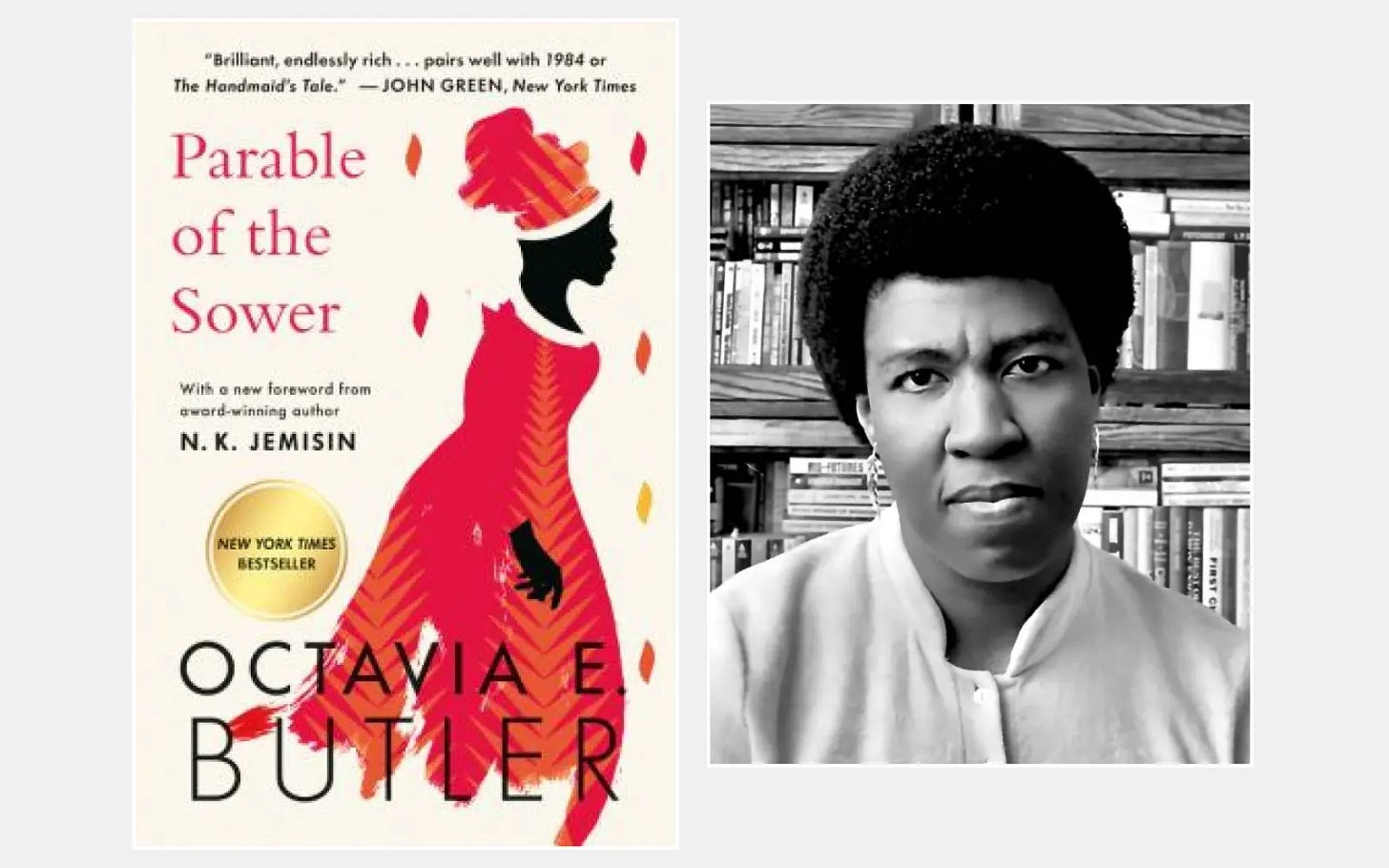This little essay is edited from a sermon I preached at a Unitarian Universalist church in San Diego in 2017, right after Trump was elected president. I will be breathing into a bag for the next few days while we wait to see the outcome of this election here in the States so writing something new feels impossible. I can feel the anxiety and trauma of that election and its results flowing in my veins, but I also feel hope and excitement for the possibility of a black woman president. The combination of dread and hope is extremely uncomfortable. If you are there with me, I send you love and deep, deep breaths.
Imagining a better world is the first step toward creating a better world.
I am not a typical Sci-Fi enthusiast. I didn’t grow up watching Star Trek, I’ve never read Isaac Asimov’s Foundation series, and I didn’t know that Star Wars is considered fantasy and not Science Fiction until I was soundly schooled on the matter late in my college career. So let me first be clear, I am not an authority on all things science fiction - not even close. What I am, is a lover of myths and a believer in the power of human invention and creativity to create a better world.
Science Fiction or speculative fiction is one way of using myths to talk about human potential and to explore moral and ethical situations that we may yet face. Science Fiction is about who we can and ought to be in the future.
The media that we consume, particularly media that takes place in the future, can actually shape the world we are working toward. 1966, Nichelle Nicols played Lt Uhura, a commandant on the Enterprise on Star Trek. She was the first black woman in a leading role depicted in space. Whoopi Goldberg, who later had a role on Star Trek the Next Generation, was 9 years old when she first saw Nicols on Star Trek. She says she went running through her house calling to her family to come and see “there’s a black lady on TV and she ain’t no maid.” Goldberg later told Star Trek creator, Gene Roddenbury, “that was the moment I knew we had a future. The moment I knew I could be anything I wanted.”
The show 24 is credited with having helped pave the way in the white American psyche for an African American president.
Dennis Haysbert, who played President David Palmer on the show, believes his role painted a picture of just how America would be if a black man were in charge, and that “viewers liked what they saw.”
An imagination battle
Activist, Adrienne Maree Brown, author of “Emergent Strategies” and “Pleasure activism” said,
“We are in an imagination battle.
Imagination has people thinking they can go from being poor to a millionaire as part of a shared American dream. Imagination turns Brown bombers into terrorists and white bombers into mentally ill victims. Imagination gives us borders, gives us superiority, gives us race as an indicator of ability. I often feel I am trapped inside someone else's capability. I often feel I am trapped inside someone' else's imagination, and I must engage my own imagination in order to break free.”
In 2015, I ran across an article in “The Nation” called, “Why Science Fiction is a Fabulous Tool in the Fight for Social Justice.” The article was an interview with Adrienne Maree Brown and Walidah Imarisha about their book, Octavia’s Brood, “an anthology of science fiction written by activist writers.” Walidah Imarisha said this about social organizing,
“Any time we try to envision a different world—without poverty, prisons, capitalism, war—we are engaging in science fiction. When we can dream those realities together, that’s when we can begin to build them right here and now.”
According the Imarisha, social justice is science fiction; a way to envision and then work toward a future not yet come to pass. I was blown away by this idea and eager to learn more.
“Octavia’s Brood” is a reference to science fiction author, Octavia Butler.
Writing mostly in the 1980s, at a time when science fiction wasn’t considered “serious literature” and was dominated by white men, Octavia E Butler, a black woman from Pasadena,CA, was the first science fiction author to receive the McArthur fellowship. Her novels center around black, female lead characters, put in nearly impossible situations.
In her novels, The Parable of the Sower and its sequel, The Parable of the Talents (written in the late 80s and early 90s) Butler gives a dark account of the United States from the year 2024 that is chilling in its prophetic accuracy. The following is a passage from Parable of the Sower” in which the protagonist, Olamina, is describing her least favorite candidate for the US presidency,
“Jarret insists on being a throwback to some earlier, "simpler" time. Now does not suit him. Religious tolerance does not suit him. The current state of the country does not suit him. He wants to take us all back to some magical time when everyone believed in the same God, worshipped him in the same way, and understood that their safety in the universe depended on completing the same religious rituals and stomping anyone who was different. There was never such a time in this country. he has a simple answer: "Join us! Our doors are open to every nationality, every race! Leave your sinful past behind, and become one of us. Help us to make America great again."
Octavia E Butler wrote these words almost 30 years before they were uttered by Donald Trump in his first campaign for president. It’s chilling, don’t you think?
Octavia Butler became one of the catalysts for the creative/social movement called Afrofuturism - a genre of art, music, and collective action that focuses on looking at the future through the lens of black bodies.
Professor and science fiction author, Tananarive Due, who teaches courses about Afrofuturism at UCLA says,
“Afrofuturism, or the black speculative arts, bends reality, either in time and space, magic, technology, often blending the past, present, and future to create another way of being. It is empowering, sometimes frightening, always illuminating... Afrofuturism is not just escape. The black speculative arts help us map our way through the challenges that are both new and as old as time, challenges that have afflicted people with high melanin content for as long as we can remember.”
For African Americans, she reminds us, it’s not the future that looms grey and desolate, but the past.
Afrofuturism uses visions of the future as energy for the current work being done. And by reading, watching, listening and artistically engaging in Afrofuturist science fiction, we are better able to imagine a more just world – one in which women of color are the architects and heroines of their own futures.
Imagining the future is the first step to creating that future.
The 80’s montage
I think one of the reasons it’s so hard to envision a way through our current political climate is that movies so often skip over the laborious, hard parts of working for justice. They make the slow, painful process of social change into a catchy 80’s-style montage of groups being formed, armies learning to defend themselves, scholars doing research, politicians convening in dark rooms, or a group of young wizards practicing spells into the night.
Or even more often, we see the very early signs of resistance and then the film cuts to black and fades back in a few years later when the slowly built resistance finally has enough power to make a more dramatic shift.
And right now, we are living through that cut-scene, those dark years of slow resistance and small achievements - and it feels nothing like an 80’s montage. It’s daily living. It’s daily resisting. But it is in those times that the real changes happen. Years from now, we will look back at this time as the crucial turning point in our history. The slow, important work we are doing now will make an incredible montage one day soon.
On Tuesday, I will vote for Kamala Harris, who is the 11th black woman to run for president. Regardless of the results, this is a historic and monumental moment - one that has changed the future of our country and its collective imagination forever.
Regardless of the results, we are not going back. There is only forward.








Hello from the post-election future! I dig the optimism of this post, despite where we are now.
And I love the shout-out for Octavia Butler, oracle. My sci-fi owes a debt to her. I wrote about what I learned from reading her novel Dawn here: singulardream.substack.com/p/opening-organically
Well said!!